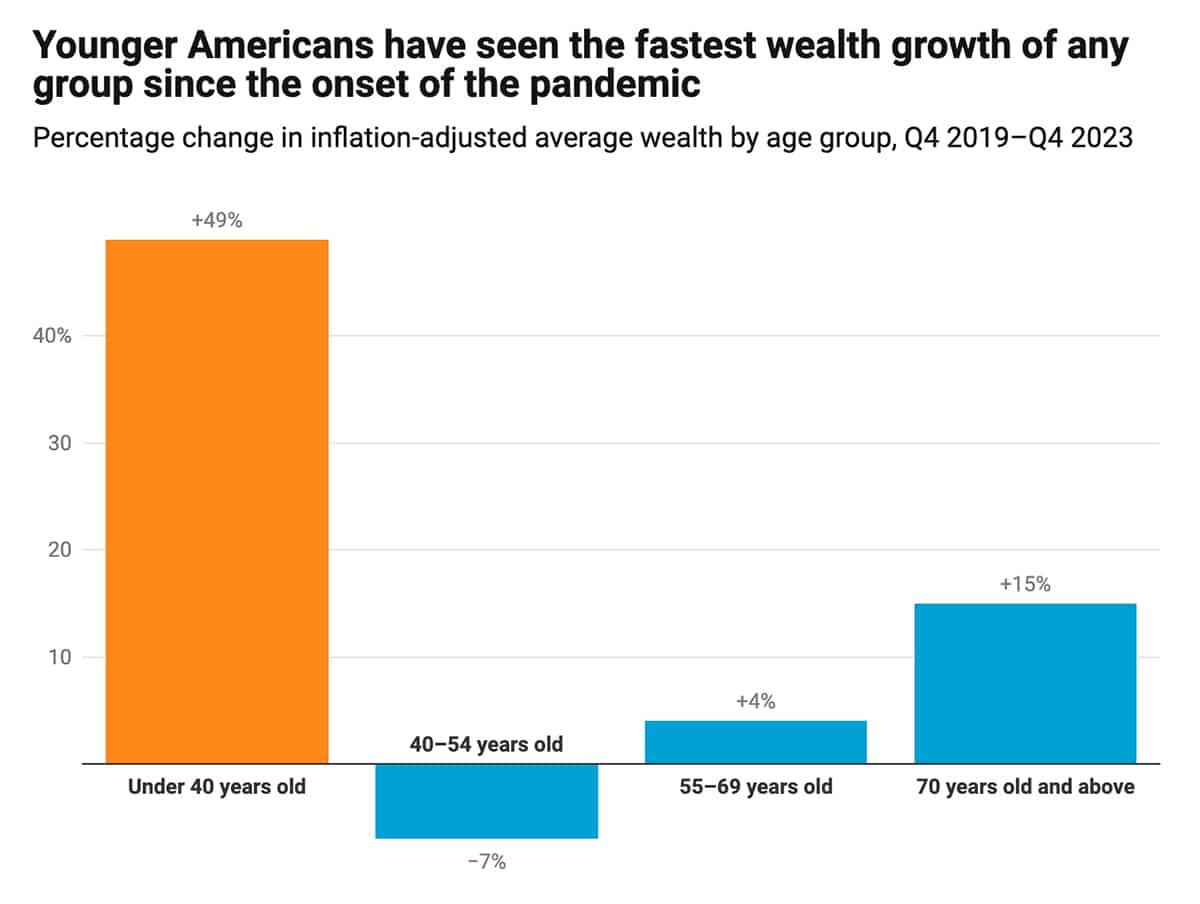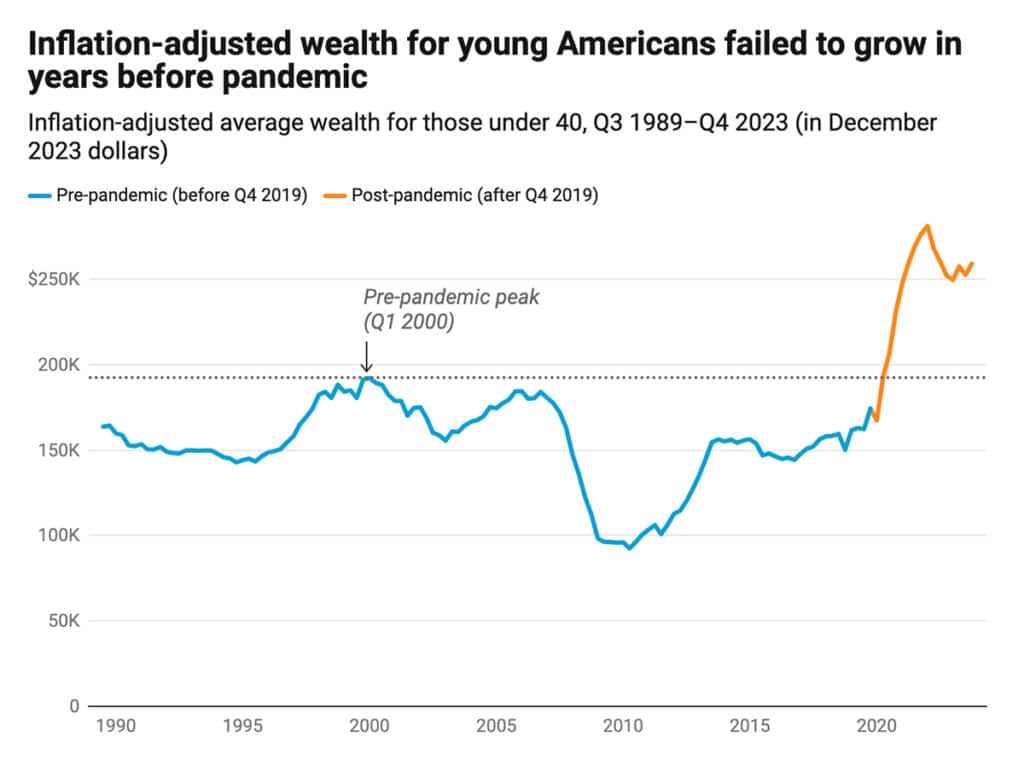Volcanoes are erupting in The Philippines, but on-fire Australia received some welcome rain. The Iran war cries have been called off and The Donald’s military powers are about to be hamstrung by the Senate. Meanwhile, his impeachment trial is starting, and we’re all on Twitter for a front-row seat.
What Could Go Right? They Rich Rich?
Gen Z is wealthier than generations before, and the wealth of all young Americans has soared post-pandemic.
This is our weekly newsletter, What Could Go Right? Sign up here to receive it in your inbox every Thursday at 5am ET. You can read past issues here.
They Rich Rich?
Last week, we posted a tongue-in-cheek video on social media about an article from The Economist headlined “Gen Z is unprecedentedly rich,” which posited that Gen Z is financially better off, at the age they are now, than previous generations were at the same age.
It went viral, with nearly 700,000 views on Instagram. The comment section was by and large one of marked disbelief. Gen Z, the generation sucker-punched by explosive rents, inflation, and student loans—rich?
Not rich, exactly—they haven’t yet had time to build substantial wealth—but comparatively rich, yes. The piece from The Economist has a global, not American, focus. It does, however, mention a paper by authors from the right-leaning think tank American Enterprise Institute and the Federal Reserve that measured median household income in the United States. Taking into account taxes, government transfers, and inflation, it found that “The typical 25-year-old Gen Z-er has an annual household income of over $40,000, more than 50 percent above baby-boomers at the same age.”
Gen Z is likely the most well-educated generation in American history. Post-pandemic, they have also been blessed by a low unemployment rate, as well as rapid growth in wages that has not been outpaced by inflation.
The growth has been so strong that it has even balanced out expensive rents. A study from RentCafe, based on data from 200 metro areas, found that zoomers in their twenties pay more for rent than millennials did at that age. But they also earn more, so rent as a proportion of income has actually stayed the same—26.5 percent—between the generations. And Gen Z is paying less, as a proportion of their income, to own a house.
It’s not just Gen Z that has financially flourished in recent years. A new analysis from the left-leaning think tank Center for American Progress says that millennials have also been the recipients of the economic conditions that have enriched Gen Z.
Using Federal Reserve data, the authors found that Americans under 40 years old have seen their wealth—assets minus liabilities—soar since 2019. Debt from credit cards and student loans has fallen, and the values of liquid assets, house ownership, stocks and mutual funds, and cars and appliances have all risen.

The speed of this wealth growth is a historic anomaly, never occurring before in the wealth data, which go back to 1989. It’s a welcome change after years of stagnation:

While the analysis presents average wealth, which could be driven up by a small number of young Americans who are “rich rich” (slang for extraordinarily wealthy), other federal data, which measures median wealth, show that the gains have been broadly distributed.
Don’t get it twisted: older Americans are still much richer than younger ones, but that is normal after a lifetime of building wealth. These days, however, the younger generations are doing much better than the popular narrative would suggest.
Update: In February, we covered how innovative technology and “a volunteer army of nerds” uncovered the secrets of a papyrus scroll buried when Mt. Vesuvius erupted. Since then, more of the so-called Herculaneum scrolls have been read, revealing the exact location of Plato’s burial place and that he was critical of the flautist who played for him on his deathbed, saying that the slave woman had a “scant sense of rhythm.” Ouch.
What Could Go Right? S6 E3

In the modern age of warfare, what does it mean for Americans to enter the armed forces? Zachary and Emma speak with veteran and author Phil Klay about the disconnect many people who serve in our current wars feel when they return back home, as well as the lack of understanding that American civilians have toward the complexities of these conflicts. Yet the military remains a major factor in the government’s budget and in Americans’ patriotic pride. This discussion leads to questions about the morals of modern warfare and the care the nation owes to the veterans who have provided their service and the allies who have assisted in our efforts. | Listen now
By the Numbers
<1: The rate of primary-age children not enrolled in school in Morocco, meaning that attendance is now nearly universal. In the 1970s, over 60 percent of Moroccan children were out of school.
87: The world literacy rate, up from 67 percent in 1979.
Quick Hits
📉 A new study has found that vaccines are responsible for 40 percent of the decline in infant mortality since 1974, representing 154 million prevented deaths.
🏎️ Did you know that in addition to the international racing class Formula One, there is also Formula E, in which only electric racecars compete? The Washington Post has a fun story on its “inevitable rise.” ($)
🏭 The G7 nations have agreed to shut down all coal-powered plants by 2035. Semafor has a brief, good explainer about this plan’s potential trickle-down effects and blindspots.
🏳️🌈 The High Court of the Caribbean island nation Dominica has overturned a ban on consensual same-sex activity that had been on the books since British rule in the 1800s. The BBC reports that several Caribbean nations have overturned these laws in recent years, including Barbados, Saint Kitts and Nevis, and Trinidad and Tobago.
⚖️ A new law in Kazakhstan has reintroduced criminal penalties for offenses most often used to prosecute domestic violence. It also makes the collection of evidence in a domestic abuse case the responsibility of the police and not the victim.
🩸 Researchers may have found a way to convert blood types to O, the universal donor. (The Economist $)
🇪🇺 For the first time, the European Parliament has passed rules on combating violence against women, including making forced marriage and female genital mutilation crimes, among other changes. They have also passed a new supply chain law that outlaws forced labor and other human rights and environmental abuses by large corporations. Member states will have three years to implement the provisions.
🇪🇺 Apartheid was overturned in South Africa 30 years ago. The New York Times’ The Morning newsletter highlights both the “joyful progress” that has been made since then and the acute challenges the country faces. South Africa will hold national elections this month.
💉 A personalized mRNA vaccine for melanoma—which could have the potential to cure the cancer completely—is entering into Phase 3 trials after previous trials found that it reduced the risk of death or return of the disease by almost half.
💊 A new drug to treat kala-azar, a parasitic disease spread by sandflies, is entering Phase 2 trials in Ethiopia. The drug, an oral pill, may be a safer and simpler replacement to current treatment, which requires 17 days of injections at a hospital.
👀 What we’re watching: Permission to grow golden rice, a type of genetically modified rice that ameliorates vitamin A deficiencies, which can kill and blind children, has been revoked in the Philippines. The nation had been the first to approve the rice in 2021. But some expect the Philippine government to win their appeal of the latest decision.
💡 Editor’s pick: Does the immune system have a more profound effect on the brain than psychiatry currently accounts for? (The Economist $)
TPN Member Originals
(Who are our Members? Get to know them.)
- This feels like Vietnam (but not enough) | Nonzero | Robert Wright
- The college campus protests | Tangle | Isaac Saul
- Will US aid help turn the tide of the Russia-Ukraine war? | GZERO | Ian Bremmer
- Using context to identify digitally manipulated media | Emma Explains| Emma Varvaloucas
- Defending Jordan’s sovereignty is not a betrayal, but a necessity | The International Correspondent | Faisal Saeed Al Mutar
- Is Biden a pro-progress Up Winger? Is Trump? | Faster, Please! | James Pethokoukis
- Self-driving cars are underhyped | Slow Boring | Matthew Yglesias
- How to find your faith | The Atlantic ($) | Arthur C. Brooks
- Will Trump’s trial deflate his personality cult? | Lucid | Ruth Ben-Ghiat
- Why are we gambling with America’s future? | NYT ($) | David Brooks
- A pro-male agenda from a nation committed to gender equity | Of Boys and Men | Richard V. Reeves
- Can wind and solar solve climate change? | FP ($) | Ted Nordhaus


